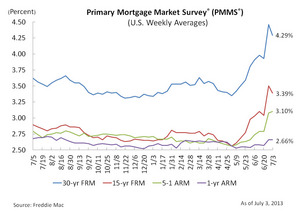MCLEAN, VA--(Marketwired - Jul 3, 2013) - Freddie Mac (
News Facts
- 30-year fixed-rate mortgage (FRM) averaged 4.29 percent with an average 0.7 point for the week ending July 3, 2013, down from last week when it averaged 4.46 percent. Last year at this time, the 30-year FRM averaged 3.62 percent.
- 15-year FRM this week averaged 3.39 percent with an average 0.7 point, down from last week when it averaged 3.50 percent. A year ago at this time, the 15-year FRM averaged 2.89 percent.
- 5-year Treasury-indexed hybrid adjustable-rate mortgage (ARM) averaged 3.10 percent this week with an average 0.7 point, up from last week when it averaged 3.08 percent. A year ago, the 5-year ARM averaged 2.79 percent.
- 1-year Treasury-indexed ARM averaged 2.66 percent this week with an average 0.4 point, unchanged from last week. At this time last year, the 1-year ARM averaged 2.68 percent.
Average commitment rates should be reported along with average fees and points to reflect the total upfront cost of obtaining the mortgage. Visit the following links for the Regional and National Mortgage Rate Details and Definitions. Borrowers may still pay closing costs which are not included in the survey.
Quotes
Attributed to Frank Nothaft, vice president and chief economist, Freddie Mac.
"Fixed mortgage rates fell over the holiday week as market concerns over the timing of the Federal Reserve's pullback in bond purchases eased somewhat. Rates are still low by historical standards and should continue to aid in housing affordability and the ongoing recovery of the housing market. For instance, pending home sales rose 6.7% in May to the strongest pace in over six years. In addition, residential construction spending increased in four of the first five months this year."
Freddie Mac was established by Congress in 1970 to provide liquidity, stability and affordability to the nation's residential mortgage markets. Freddie Mac supports communities across the nation by providing mortgage capital to lenders. Today Freddie Mac is making home possible for one in four home borrowers and is one of the largest sources of financing for multifamily housing. For more information please visit www.FreddieMac.com and Twitter: @FreddieMac.
